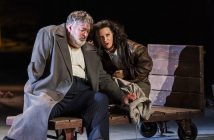Oh to be a percussionist in Verdi’s Requiem. Watching Heather Corbett of the BBC Scottish Symphony Orchestra thwacking the bass drum in the walloping second movement that is the famous ‘Dies irae’ would have given you serious anger management-related envy last week, as Donald Runnicles conducted the Italian composer’s ‘Mass for the dead’ at the BBC Proms.
And as those thumps interjected the thunderous exclamations from the brass, the wall of sound generated by the Chorus of the Deutsche Oper Berlin rolled over the Royal Albert Hall with the monstrous might of an avalanche. As well it should have done given that the ‘Dies irae’ depicts the ‘Day of Wrath,’ when God shall judge the world – you’d be pretty scared, too. But the real splendour of this ferociousness was its contrast to the first movement, which Runnicles introduced so quietly that it was troublesome working out whether the piece had even begun yet, despite the moves of his baton. The volume was teasingly soft, as though the violins were merely whispering (the ‘cellos – who come in first – were near inaudible), and this captured the inevitable excitement that fills the air on a prom night, amassing it into one, almost hypnotic event on-stage.
Indeed, the melodramatic nature of Verdi’s 1874 work is one of its most divisive aspects. One initial critique of it was from a scathing Hans von Bülow, who called it “an opera in ecclesiastical garb.” He later retracted this assessment but, given that Verdi was a staunch non-believer, and held a lifelong affinity for the theatre itself, it is little wonder that his emotive take on a Catholic Mass should ruffle some feathers. The Requiem was fuelled by Verdi’s high regard for the composer Gioacchino Rossini and the poet Alessandro Manzoni, and thus it expounds, very touchingly, the human fear of death – and what might then be to come – with both gravitas and compassion.
This emotional sophistication was depicted beautifully by the professional chorus, whose warmth and unity of tone, and strength (exhibited as much in their control as their outbursts), placed the music in very safe hands. The only snag was their hefty annunciation of consonants occasionally landing out of kilter. Not the end of the world, I’ll admit, as it’s wonderful to hear such diction, but their labours did seem displaced at times, which was a bit of a shame. Nonetheless, this overall quality and attention to detail was mirrored by the BBC Scottish Symphony Orchestra and, with both outfits falling under Runnicles’ direction, it explains their dynamic responses to his leadership. Taking the pace rather enthusiastically throughout, the conductor could have allowed a little more space at certain moments during the solos, but at least he maintained momentum, and to great effect.
Three out of the four soloists were making their Proms debuts with this performance and it must have been a disappointing evening for tenor Yosep Kang, whose voice faltered on several instances, including his first – and highly exposed – entry. A much better night was enjoyed by American soprano Angela Meade, whose glisteningly light and agile sounds soared in and out of Karen Cargill’s lusher ones; a Proms veteran compared to her colleagues, the Scottish mezzo unquestionably anchored their ensemble with her powerful organ of a voice. And whilst her tone sat in marked contrast to Meade’s, this pairing did seem to work. It even served to accentuate the lightness of Meade’s concluding ‘Libera me,’ as though this consideration of the afterlife took her to another plane altogether during the higher sections. Raymond Aceto’s bass part, though adeptly performed, got slightly lost under the orchestra’s weight – its roundedness edging into the realm of the muffled.
Another notable performance came from the lead bassoonist, Julian Roberts, whose achingly serpentine solo during the ‘Quid sum miser’ earned him one of the loudest applauses; just one more example of how Verdi’s poeticism can so poignantly be highlighted amongst the histrionics. Said applause, incidentally, only happened once Runnicles had let go of that magical moment when the echo of the final sounds are just fading away and the baton is still raised in the air, and to witness an Albert Hall as captivated as that for quite such an extended period is testament to performers’ engaging efforts. After all, when there’s stomping in the stalls, you know they must have done something right.
BBC Proms 2015 runs until 12th September. For information and tickets visit the www.bbc.co.uk/proms.




